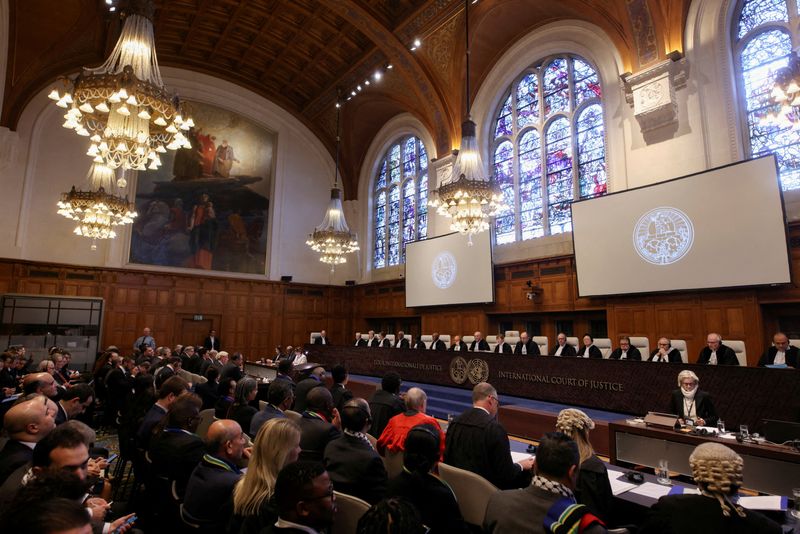Explainer-What war crimes are Israel and Hamas accused of one year on?

By Stephanie van den Berg
THE HAGUE (Reuters) – The year-old conflict between Israel and Hamas in Gaza has triggered several legal cases at international courts in The Hague involving requests for arrest warrants as well as accusations and denials of war crimes, crimes against humanity and genocide.
Here are details about the cases.
WHAT LEGAL CASES ARE THERE STEMMING FROM THE WAR IN GAZA?
Israel faces two legal proceedings related to the Oct. 7 attacks by Hamas and the ensuing war in the Gaza Strip at international courts in The Hague.
The International Criminal Court (ICC) is considering a prosecution request for arrest warrants against Israeli Prime Minister Benjamin Netanyahu, Defense Minister Yoav Gallant and two Hamas leaders for alleged war crimes and crimes against humanity.
Israel also faces charges of alleged state responsibility for violations of the 1948 Genocide Convention in the war in Gaza at the International Court of Justice (ICJ).
WHAT IS THE DIFFERENCE BETWEEN THE ICC AND THE ICJ?
The ICC is a treaty-based international court that prosecutes individuals accused of war crimes, crimes against humanity, genocide and the crime of aggression.
Although Israel is not a member of the ICC and does not recognize its jurisdiction, the court admitted the Palestinian territories in 2015 and opened an investigation into alleged crimes in the occupied Palestinian territories in 2021. It can prosecute crimes committed by nationals of its 124 member states or on the territory of member states by other actors.
The International Court of Justice, also known as the World Court, is the United Nations’ top court for disputes between states and alleged violations of U.N. treaties.
In December last year South Africa filed a case against Israel alleging violations of the 1948 Genocide Convention in the war in Gaza.
AT WHAT STAGE IS THE WAR CRIMES CASE AGAINST ISRAEL’S NETANYAHU?
In May prosecutors asked for warrants for Netanyahu and Gallant, saying there were reasonable grounds that the men committed war crimes and crimes against humanity by systematically depriving civilians in Gaza of “objects indispensable to human survival” including food, water, medicine and energy.
There is no set deadline for judges to decide on the warrants. Pre-trial judges often take months to decide on such requests. Dozens of countries have filed submissions in the high-profile case. Israel contested the request on Sept. 20. Any potential ICC trial regarding the Israel-Hamas conflict is likely years away.
WHAT ALLEGATIONS ARE THERE AGAINST HAMAS?
ICC chief prosecutor Karim Khan in May also asked for arrest warrants for Hamas leaders Yahya Sinwar, Mohammed Deif and Ismail Haniyeh for alleged war crimes and crimes against humanity, including murder, rape and the taking of hostages during the Oct. 7 attacks on Israel.
In September, the ICC announced it had terminated the case against Haniyeh following his death in July. The prosecutor also said he is looking into the reported death of Deif, and will withdraw the case against him if it is confirmed.
WHAT HAPPENS IF THE ICC ISSUES WARRANTS?
All ICC member states are obliged to arrest and hand over anyone subject to an ICC arrest warrant if they set foot on their territory.
The court has no police force, so the arrests of suspects must be carried out by members. In the past ICC states refusing to carry out warrants have received little more than a diplomatic slap on the wrist.
WHAT IS HAPPENING WITH THE GENOCIDE CASE AGAINST ISRAEL?
Last December South Africa filed a case against Israel at the ICJ for allegedly violating the Genocide Convention.
South Africa has asked several times for immediate emergency measures while the parties wait for hearings on the merits, which can take years to get under way. In January the judges found it was plausible that Israel violated some rights of Palestinians in Gaza under the genocide treaty and ordered Israel to ensure its troops commit no genocidal acts.
The court has ordered Israel to ensure basic food supplies for Palestinians in Gaza and immediately halt its military offensive in Rafah.
South Africa must submit its full case by late October, while Israel has until July next year to respond.
If countries do not comply with ICJ orders, the court can order reparations, including financial compensation.
(Reporting by Stephanie van den Berg; Editing by Anthony Deutsch and William Maclean)